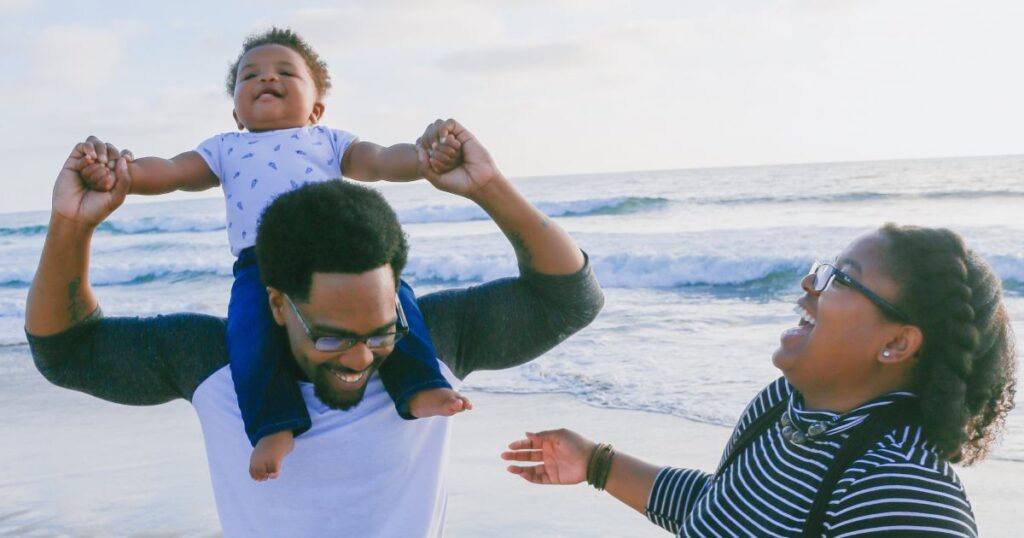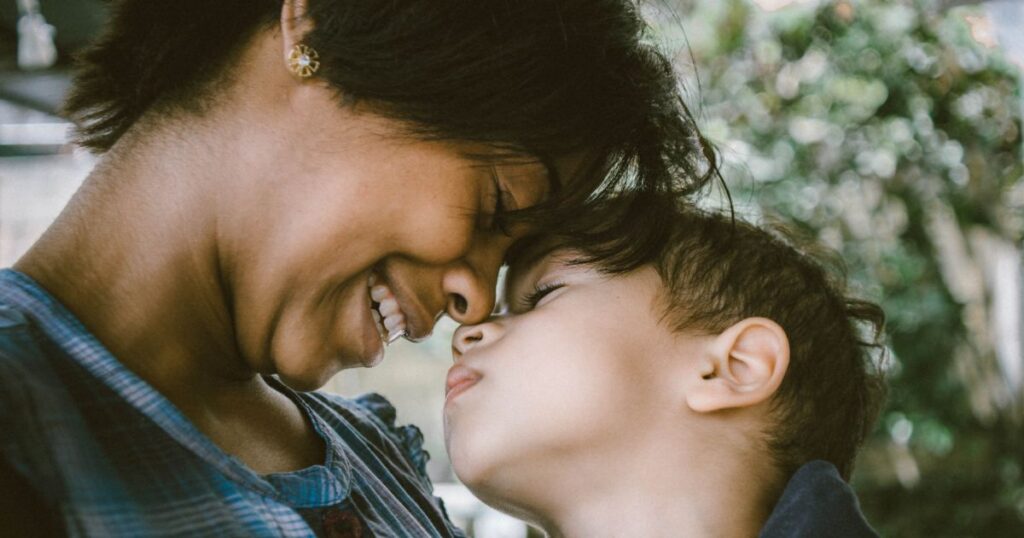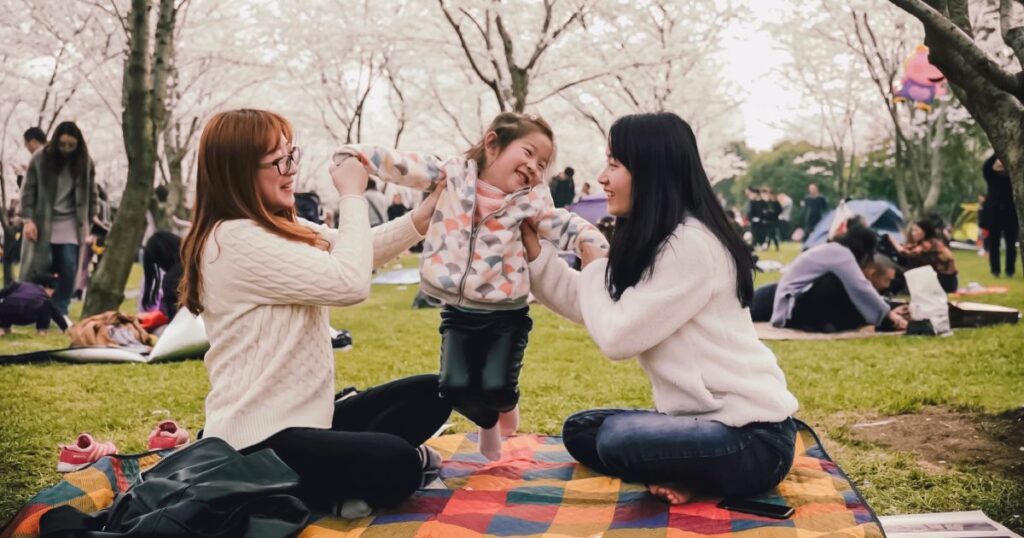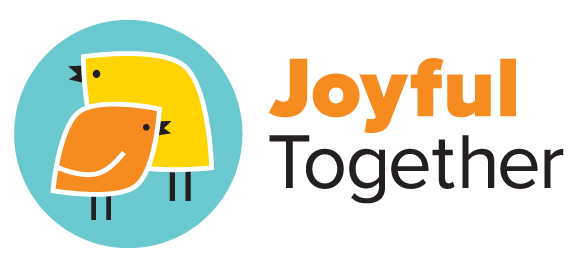The Joyful Together® Model
Developed by OhioGuidestone‘s Institute of Family & Community Impact®, Joyful Together® is an evidence-based, play-centered, and parent-implemented model that infuses joy into everyday moments. Our research has shown that it lowers parental stress, improves parent-child relationships, and increases childhood resiliency.

The Need for Joy
We created this tool for caregivers because of the pressing need for it among our families and communities. Nearly half of all children in Ohio have at least one adverse childhood experience, while one in seven have three or more.
Why do we care so much about this? Because we know adverse childhood experiences can lead to toxic stress and trauma, impacting brain development and increasing the risk of long-term negative health effects.
Despite these concerning numbers, hope is not lost. Joyful experiences through play can counteract negative effects from the stressors of adversity, building a buffer of resiliency. This, then, is our goal for Joyful Together®: to empower families to create spaces of joy and play in their lives.
The Science of Play and Joy: Care + Play = Joy
At its heart, the Joyful Together® model is founded on the simple idea that Care + Play = Joy. That is, when caregivers play with and nurture children, they create joy. Joy experienced through playful and nurturing activities can bolster relational health and combat toxic stress and adversity in children and their parents and caregivers.
As parent/caregivers increase their joyful play with children throughout their daily routines, they activate the brain’s reward system while enriching their attachment with their child, reducing parent/caregiver-related stress, and supporting their child’s healthy brain development.
Playing with a loved one elicits positive emotional or “affective processes” with neurotransmitters such as oxytocin, endorphins, and naturally occurring opioids that combat the effects of elevated stress hormones due to trauma, toxic stress, and adversity.

Trauma, Toxic Stress, and Adverse Childhood Experiences (ACEs)
Although they can be (and often are) related, trauma and toxic stress are distinct phenomena. In order to understand how joy protects and bolsters child brain development, we first must understand why trauma, toxic stress, and adversity can threaten it.
Psychological trauma is an event or circumstance that is so strong or impactful that it overwhelms one’s ability to overcome and cope. Post-traumatic stress disorder, or PTSD, is commonly associated with traumatic experiences. But even when a person does not develop PTSD from a traumatic event, the trauma can still impact our brain and our body. This especially is true for children, since they are still physically (and psychologically) developing.
Toxic stress is the experience of “strong, frequent and/or prolonged adversity without adequate adult support” to help regulate the nervous system. Not all stress is bad, but stress that is chronic and/or intense can overwhelm the body’s stress response system. Sometimes, this stress is due to a traumatic event, but not always. Systemic daily discrimination and oppression — such as poverty, racism, and so on — can elevate stress levels, thus inflicting insidious harm.
Adverse childhood experiences, often simply referred to as ACEs, are any adverse events in a child’s life that could lead to toxic stress and/or trauma, such as neglect, experiencing or witnessing violence, and the death of a loved one. Since the seminal CDC-Kaiser ACE Study in the mid-1990s, ACEs have been linked to significant long-term risks to children, families, and communities. Thus, prevention experts have sought to reduce both the occurrence of ACEs and their impact on children.
What This Means for Families
We believe that every family, no matter their circumstances, deserves to experience joy. Because Joyful Together® incorporates everyday life into its model, it helps foster joy in ways that are culturally responsive, focused on social and concrete supports, and cognizant of the realities of economic hardship, racism, discrimination, and marginalization experienced by many families.
While Joyful Together® alone cannot solve these problems, it can help give parents of young children a renewed sense of playfulness and joy and reduce some of the worst effects of toxic stress.
By leveraging parents’ own innate ability to nurture and play with their children, we hope that models like ours can give parents the tools, support, and self-efficacy they need to be the best caregivers they can be. Most importantly, we want to help empower parents to fulfill not just their needs but their dreams and desires, too — for themselves, for their children, and for their communities.

What’s Next?
Since we based Joyful Together® on extensive research, we know that the core of the model is strong and science-based. But we want all children and families to have the best outcomes possible — to succeed and flourish. So we are continuing to test our model to keep it at the cutting edge.
We currently are researching how the Joyful Together® model works in a number of settings: homes, schools, childcare centers, and more! If you are interested in learning more about our research, please contact us or visit our Research Portal for study participation opportunities.
Come join the many families who have benefited from Joyful Together®!
Do Activities Anywhere, Anytime — It’s Easy!
Just by adding joyful play into everyday activities with their children, parents, caregivers, and families can:
- Improve Relationships
- Improve Childhood Resiliency
- Lower Parental Stress
What caregivers say about Joyful Together®:
“[Daylin] woke up in a mood today! He was screaming and acting a fool, and said he wasn’t going to go to school today. He wouldn’t put on his clothes, and I didn’t know how I was going to get out the door to work. Well, I tried your games. I gave him some Eye Hugs, and then we played Apple Pie, and he started laughing and his mood just flipped. I just wanted you to know, and to thank you for that.”
– Miriam, Daylin’s foster mom
(Names have been changed to protect privacy)
Get a glimpse into Joyful Together® activities.
